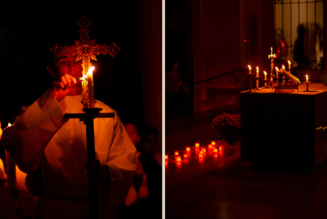Making judgments is a privilege of persons only. A privilege that is necessary, both to live well on earth and to enter Heaven.
 There are at least nineteen different kinds of judgment that we should distinguish. I’m sorry I could not find a twentieth, to match the number of digits on our fingers and toes. But nineteen does match the digits of Frodo Baggins, one of my heroes. (I’m sure you remember Frodo of the Nine Fingers, and Gollum of the Eleven.) The importance of the topic wisely assigned to me—judgment—is obvious. For one thing, making judgments is a privilege of persons only. For another thing it is necessary, both to live well on earth and to enter Heaven.
There are at least nineteen different kinds of judgment that we should distinguish. I’m sorry I could not find a twentieth, to match the number of digits on our fingers and toes. But nineteen does match the digits of Frodo Baggins, one of my heroes. (I’m sure you remember Frodo of the Nine Fingers, and Gollum of the Eleven.) The importance of the topic wisely assigned to me—judgment—is obvious. For one thing, making judgments is a privilege of persons only. For another thing it is necessary, both to live well on earth and to enter Heaven.
I will say one thing about each of these nineteen kinds of judgments. It may not be the most important or most fundamental thing that can be said about them, but it will be a point I believe is important enough to take two minutes, of a captive audience’s precious time to think about.
The first kind of judgment is judgment as such, judgment in the abstract. By this I mean the logical form of judgments: The affirmation or denial that a predicate belongs to a subject; that some state of affairs is true or is not true. This is “the second act of the mind” in traditional Scholastic logic, and the only one that contains truth. The first act of the mind, simple apprehension or conception, does not contain truth because it merely conceives of concepts, which are neither true nor false, but are the raw material or contents of true or false judgments. Thus neither the concept “apples” nor the concept “fruits” is true or false, but the judgment “Apples are fruits” is true. The third act of the mind, reasoning, moves from the presupposed truth of one or more judgments, as premises, to the truth of another judgment, as the conclusion to be proved. Concepts tell us what, judgments tell us whether, and reasoning tells us why. We understand essences in concepts, existence in judgments, and causes in reasoning.
Because concepts attain only essences while existence is attained only in judgments, this essential logical structure of thought implies the distinction between essence and existence, one of the most important principles of metaphysics and the basis for Thomas Aquinas’ best proof for the existence of God: the proof from contingent beings to a necessary being—that is, from the premise of the existence of beings whose essence is not existence to the conclusion of the existence of a being whose essence is existence, as the only adequate answer to the question of why these other existing things exist. If their existence does not come from within their own essence, it must come from outside, from a cause. Only a Being whose essence is existence can explain the existence of beings whose essence is not existence, as their cause. Only a Being that explains itself can explain the beings that do not explain themselves.
The distinction between essence and existence, and between concepts and judgments, also explains why St. Anselm’s famous “ontological argument” is invalid: It confuses essence and existence, treating existence as an essence, a “what,” or a property. My point here is how centrally important it is that only judgments attain ontological existence and logical truth. When we investigate concrete particular judgments rather than the universal, abstract, logical form of judgments, we find that they are made either by humans, or angels, or God, who are the only three kinds of personal beings we know, except for lawyers and Deconstructionists.
I. Human Judgments
Let’s look at human judgments first, for obvious reasons. Within human judgments, the most fundamental distinction is between theoretical and practical judgments, i.e. judgments of truth and judgments of goodness. All judgments are made by the intellect but theoretical judgments regulate thought while practical judgments regulate practice, or life, or action.
A. Theoretical Judgments
Our second kind of judgment is the theoretical judgment. It is both very significant and the primary cause of the decline in the popularity of classical education that the words “theoretical,” “speculative,” and “contemplative,” have all lost their honorable connotations in our culture. Instead of referring to truth, the words “theoretical” and “speculative” both now connote “uncertainty.” And “contemplative” is limited to monks and mystics. This is a symptom of deep cultural decay, and it stems largely from Francis Bacon, who announced a radically new Summum bonum (greatest good) for our culture: The conquest of nature by applied science. In other words not truth but power; not conforming the human mind to reality but conforming reality to the human will.
An icon of this cultural decadence can be seen near my home town, in Cambridge, Massachusetts. It is supremely ironic that Veritas (Truth), the official motto of the flagship educational institution of America, Harvard University, is a word that is never uttered inside most of the humanities courses on that campus without ironic quotation marks around it. In a Baconian civilization, our art forms, especially movies, get by telling limitless lies about life while infallibly improving their special effects. In other words, technology trumps truth.
B. Practical Judgments about Goodness
But enough about the twelfth kind of judgment, theoretical judgments of truth. My next eleven kinds of judgment will all be practical judgments about goodness. This group of eleven begins with the third kind of judgment—a judgment about practical judgments—namely, the judgment on the part of most modern philosophers that there is an absolute gap between theoretical judgments of fact and practical judgments of value. This dogma of the absolute fact-value distinction is the justification for moral relativism, the idea that values are relative to our subjective feelings and choices rather than to objective truth. Moral relativism is the disease that C.S. Lewis, a sophisticated and polite Oxonian, said “will certainly damn our souls and end our species.”
It will damn our souls because salvation requires repentance, which in turn requires admission of sin, which in turn requires a real, objective moral law to sin against, which requires objective values. It will end our species because it amounts to a conscience-ectomy, as in Brave New World. Those people are not humans, they are yuppies. Their bodies look human but their souls look like puppies. If and only if values and facts are not absolutely distinct, if values are a special kind of facts, can moral values can be objectively real and can there be a natural moral law. (Notice how much more uncomfortable and demanding the word “law” is than the word “values.”) But if not, not. If the fundamental principle of morality is that “Good is to be done and evil is to be avoided,” then ought depends on is, ethics depends on metaphysics and reason. If, instead, morality is simply the command of the will that makes the rules of the game, then moral law is a dictate of will, not of reason—which is the philosophy of Nominalists, Asharites, fundamentalists, Euthyuphro, Ockham, Machiavelli, Hobbes, Rousseau, Marx, Hitler, and Satan. God says “Come let us reason together.” Satan does not. God appeals to reason, Caesar appeals to force.
That is, unless our Caesars are classically educated, in the tradition of Plato and Aristotle. On the very first page of Plato’s Republic there is a little scene that sets the fateful choice for Western civilization. Socrates, with a few companions, meets a larger group of friends and there is a contest of wills. The larger group wants Socrates to change his plans and come with them. Their spokesman says to Socrates, “You see how many we are, so either dig in your heels and stay here or else fight us.” And Socrates replies, “Surely there is a third alternative: that we persuade you that you ought to let us go.” Rational moral persuasion—the key to the good society for Socrates, Plato, Aristotle, and medieval Christendom. And we? Are we Platonists or Machiavellians?
If we believe in a real natural moral law, a fourth kind of judgment becomes possible: the judgment about these real moral goods. The word “good” has three basic meanings, says Aristotle, the master of common sense: the moral good, the pleasant good, and the useful good. Judgments about pleasure and utility can still be made without a natural moral law, but real moral judgments cannot. Aquinas sees these judgments as most fundamentally about ends. Like Aristotle, he is teleological. Kant sees them as most fundamentally about duties. But both believe reason can make moral judgments because reason knows the moral absolute, whether it is the ultimate rational end of Eudaimonia (blessedness, true happiness) or the ultimate rational duty of the Categorical Imperative. It is not feeling or desire or passion that makes moral judgments, but reason—reason in the old, honorable, broad, ancient sense rather than in the narrowed, modern, computer-like sense. Philosophers who thought that moral judgments are made by the latter type of reason—philosophers like Hobbes, Rousseau, Hume, Mill, Marx, and Russell—do not have an incomplete moral philosophy, they have none at all, just as a primitive who makes up fantastic stories about the constellations does not have a primitive astronomical science but no science at all.
A fifth kind of judgment concerns how we can rightly make these moral judgments. How can we judge how to judge morally? And the answer comes from our two paragons of common sense, Aristotle and Christ. Aristotle says we must be good in order to make good moral judgments; that we must cultivate moral habits, and thus moral character, by repeated right choices of the will, if we are to be morally wise and perceive moral good and evil rightly with the intellect. The will should obey the intellect but the intellect also needs to be educated by the moral will. The good will tames the intellect as a woman tames a man. It’s like the classic line from the movie My Big Fat Greek Wedding: “The man is the head of the woman, but the woman is the neck that turns the head.” Christ appeals to this same psychological principle when speaking of the religious good, when he answers the Pharisees’ question “How can we understand your teaching, and whether it is from God?” by saying that “If your will were to do the will of God, you would understand my teaching, and that it is from Him.” That is the basic principle of Biblical hermeneutics in one sentence.
A sixth kind of judgment is the prudential judgment about how to attain pleasure, happiness, or joy—three ever-deepening levels of the same thing, though we do not have a single generic word for it. This is the that which is desirable for its own sake, rather than as a means to some further end; not because it is our moral duty, but just because it satisfies our restless heart. Some fools judge pleasure to be enough, and some misjudge even what things will give them pleasure (money, power, and drugs are obvious examples). But pleasure and even happiness gets boring; only joy satisfies us. So if we are wise, we will not compromise this goal nor settle for anything less. In other words, we will give Aquinas’ answer to God’s question to him: “You have written well of me, Thomas; what will you have as a reward?” Thomas’ answer was: “Only Yourself, Lord.” Have three wiser words ever been spoken?
A seventh kind of practical judgment is judgment of utility: What means will best attain our end, whether pleasure or morality? Experience is the only answer to how to judge what to do to attain pleasure. On the other hand, commandments, both externally revealed to Moses and internally known by conscience, are the answer to how to judge what to do and what not to do to attain moral goodness. These commandments are very easy to know and hard to obey, so our sophists have cleverly solved that problem by making them harder to know and easier to obey, or at least harder to disobey; in fact, sophists making them harder to disobey precisely by making them harder to know, i.e. by nuancing them and juggling them and doing fancy little dances around them. The first sophist was the devil, in Eden: “Did God really say that?”
An eighth kind of judgment is not the judgment of natural law or natural good, but positive law and positive goods, such as man-made laws, human laws. This is the kind of judgment made by professional lawmakers, professional law-enforcers, and professional law-interpreters, i.e. congressmen, policemen, and judges. I have little to say about judging what laws to make, or how to enforce them better, but I have something to say about judging what the motive for sanctions and punishments must be because it is an answer most intellectuals in our society now deny. The essential motive for punishment should be neither rehabilitation nor deterrence; rather, it should be justice. Even though charity is the highest motive, and your personal motive for rehabilitation is charity to the criminal whom you want to rehabilitate; and even though your personal motive for deterrence is also charity to possible future victims that you want to protect, while the personal motive for justice, even when it is not confused with vengeance and hatred, is not this personal charity; it is essential that justice be the first motive and the absolute standard. Otherwise, we will give unjust, undeserved punishments just because we think they will work better to rehabilitate or deter. Judgments as to what will rehabilitate or deter are uncertain because they depend on our very fallible predictions of the future and our very fallible understanding of the criminal’s character. Judgments of positive-law justice, on the other hand, do not depend on these two uncertainties and thus can be much clearer. And so are judgments about natural-law justice (to everyone but a sophist).
A ninth, and closely related, kind of judgment that is often made by federal judges or supreme court judges in our society today in interpreting the law, is often called “dynamic” or “creative” or “progressive” or ” flexible” interpretations. These are what allow “judicial activism.” It is exactly parallel to “dynamic” or “creative” or “progressive” or “flexible” interpretations of the Bible, by which you can make the Bible to teach pretty much anything you want, from flat earth science to Communist revolution. The same judicial philosophy which, in Dred Scott found that black slaves were only semi-human property rather than persons, found the privacy rights in the Constitution’s “penumbra” that justified the murder of a baby in the womb. It might find anything else there tomorrow; anything at all. The philosophical principle here is simple: We do not discover and obey truth, we create it with our judgments. Truth is not the subordination of thought to reality, but to our will. In the words of Justice Anthony Kennedy in Casey vs. Planned Parenthood, “at the heart of liberty is the right to define for oneself the meaning of life and the mystery of existence.” In other words, “God, you have to get out; you’re sitting in my seat.”
Still another kind of positive judgment—this is our tenth kind—is made not by individual judges but by a public community as a whole. This used to mean representational democracy, in which important issues were decided by the judgment of concrete, individual persons, by popular vote—either directly, by referendum, or indirectly—by electing representatives. Today, it is the unelected media and climate of opinion they create that determines the most important issues. It is what Alexis de Tocqueville prophetically called “soft totalitarianism.” The most influential philosopher who defended this is Rousseau with his notion of the infallibility of “the general will.” It is “the general will,” or the Zeitgeist, that influences the judgments of our unelected judiciary on such momentous issues as redefining marriage. The issues judged by the judiciary are typically much more culturally, morally, and personally important than the largely economic issues determined by Congress or the President.
C. Judgments about Persons
Another way of classifying judgments is in terms of their personal objects. We can judge God, ourselves, and others. Let these be our eleventh, twelfth, and thirteenth kinds of judgments.
Regarding judging God, I already mentioned one way this is now done, by a “creative” interpretation of the law. A creator, as distinct from an interpreter, has no data and no bounds; therefore, his judgments are never wrong. Moose are large and geckos are small only because the real world limits our creativity, but elves can be either large, as in Tolkien, or small, as in Shakespeare, whatever we desire. How do we do this to God? George Bernard Shaw tells us: “They say God created us in his own image, but we’ve been returning the compliment to Him ever since.”
Careful, though. Because there are many gods on the market, we must judge among the various candidates, and in that sense judge God. Otherwise, we simply arbitrarily decree which god is God. And the two standards are truth and goodness, rationality and morality. We must judge any logically self-contradictory God and any evil God to be false and unworthy of belief, because we have these two absolute standards in our own souls that are absolute, indubitable, and self-justifying. We literally cannot believe anything that is so irrational as to be self-contradictory, and therefore literally meaningless, even if we call it God; and we literally cannot accept what is intrinsically unacceptable because it is logically self-contradictory, or love what is really, literally unlovable. God Himself has placed these two prophets in our conscience, and when we use them honestly and in submission to objective truth and goodness rather than our own will, we judge with divine authority. A meaningless self-contradiction does not suddenly become meaningful and believable, and an intrinsic evil does not suddenly become good, when someone says “God can do it.” God can do what is physically impossible but not what is logically or morally impossible. That is why Christ had to die: because God could not simply pretend we had not sinned, or say “Justice? Forget about it.”
Our twelfth kind of judgment is judging ourselves. This is subject to a cruel trilemma. If we judge ourselves, we must find ourselves either morally good, or morally wicked, or halfway in between. If we judge ourselves as morally good, we become self-satisfied Pharisees. If we judge ourselves as morally wicked, we become self-loathing worms who cannot love our neighbors as we love ourselves because we cannot love ourselves. And, if we judge ourselves as halfway between, as mediocre, as wishy-washy, we are lukewarm Laodiceans who deserve the shocking divine word of judgment in Revelation. The word is: “vomit.” Look it up. The solution is simple: We should judge our sins but not our selves. If we habitually look at God instead of ourselves, we will not succumb to anyone of the three horns of the trilemma, for in the light of His face we cannot judge ourselves to be worthy, or worthless, or waffling.
Our thirteenth kind of judgment, judging other individuals, is, as we all know, dangerous and forbidden by Christ Himself because judging persons as distinct from actions is God’s prerogative. Of course, that does not forbid us to judge actions, for to do that would undermine all morality. Today, there is only one class of people who always deny this distinction, between sins and sinners, actions and persons; who say that their whole personal identity is what they do, and therefore, if we reject what they do, we reject what they are; that to hate their lifestyle is to hate them, the whole, the person, the I. That is a religious judgment—to identify something with the whole self. These people who support this new religion now rule the media; in fact, they rule so well that I would probably be prosecuted for “hate speech” if I dared to identify them, though we all know who they are. They are the only people in the world, other than Muslim terrorists, who are obeying Winston Churchill’s formula for winning a war, whether a military war or a culture war: “Never, never, never, never, never give up.”
II. Non-Human Judgments
A. Angelic Judgments
All thirteen kinds of judgment so far are made by humans. There is a fourteenth kind of judgment because there exists, in addition to humans, one other known species of created persons: angels. Their judgment, according to “The Angelic Doctor,” Thomas Aquinas, is more like that of a woman than that of a man: intuitive rather than ratiocinative, “big picture” synthetic rather than step-by-step analytic. Therefore, being closer to the mind of the Author of our human drama than we are, they are good instruments of divine providence. We should cultivate their friendship and pray for their inspirations, and trust them when they come, because their judgments are by nature wiser than ours. (This is also true of women, by the way, if I may speak as a man to other men and pretend that women are not listening and giving us that “I told you so” look that makes us feel and look like deflated tires.)
B. Divine Judgments
Finally, God judges in at least five ways: to create, to identify, to provide, to incarnate, and to consummate. He gives us our universe, our personal identity, our lifelong provision, our salvation, and our glorification.
He created the universe freely, not necessarily, so He judged that it was good to create, both before and after He created. That is the fourteenth kind of judgment, the kind employed by angels. “Good, good, good,” he muttered, judgmentally, after each day’s work of creation. The answer to the atheist’s strongest argument, the problem of evil, is here in this judgment: That it was better to create a large family of mankind even foreseeing that they would be severely retarded delinquents, than not to create us at all (or even not to create anything at all, and to keep everything safe and perfect, like a yuppie couple who refuse children). Thank God, God is a little crazy. As my grandmother once said, “Having fits is more rational than having children.” But we cannot rationally justify God’s judgment that it was better to create than not to create, for there is no higher standard, no premise, from which we can deduce that conclusion. If the universe were necessary, we could be sure of it; but since it is contingent, we can only be thankful for it. That is judgment fifteen, and divine judgment one.
Judgment sixteen (divine judgment two), is the judgment that it was not only good but “very good” to create us in His image. Since God’s own eternal essence, revealed only once, to Moses in the Burning Bush, is Person as well as Being, I as well as AM, He shared that image, that I-ness, that personhood, that subjectivity, that spiritual self-consciousness, with us. And since He is the Author of our very existence, we have no identity apart from Him any more than Hamlet has identity apart from Shakespeare. When He said “Let there be Peter Kreeft,” He judged this confused, fearful ball of animal string that rolls down the world’s gravity slopes unraveling the strands of its identity with every turn, to be something good to create. And even though that is crazy, it is sacrilege for me to disagree with Him, to judge contrary to His judgment.
Our judgment seventeen, and divine judgment three, is divine providence. The three presuppositions of divine providence are the three most non-negotiable premises of theism: that God is all-powerful, all-wise, and all-benevolent. To judge all three as true logically entails the astonishing conclusion of Romans 8:28: That He works all things, even evils, together for our ultimate good if only we let Him by trusting Him and loving Him and entering into the bloodstream or life-stream of His will, which directs all the growth of our souls and bodies by what He judges best for us in the end. It is certainly difficult to believe this, and to trust Him that much, as Job discovered in his own experience, but it is as necessary as it is difficult. For the alternative is to deny either His omnipotence, or His omniscience, or His omnibenevolence, or the laws of logic—all of which are non-negotiable. He is our perfect guru, and every event He brings into our life is a move on His chessboard against the devil and the devil’s pawns, which are the world and the flesh. God does not make any wrong moves or lose any games. His judgment is perfect.
Judgment eighteen, and divine judgment four, is His judgment that it was best to incarnate His Son to give His body and blood—all twelve quarts of it—for our salvation. This too is a judgment we cannot understand or prove by any prior premises that are available to the human mind, and therefore one that we can only accept with gratitude and wonder, as we accept creation and providence. Gabriel Marcel made famous the distinction between problems and mysteries: Problems can be solved because they are outside us; mysteries cannot because the solver is himself the problem. In Marcel’s words, a mystery is a problem that encroaches upon its own data. God judged the problem of human life to be a mystery and solved it by becoming it. “He became sin for us that we might become the righteousness of God in Him.” C.S. Lewis said that if the theologians only completely understood that little word “in” they would have no questions left.
Judgment nineteen, and divine judgment five, is “the last judgment.” To consummate our creation, providential preservation, identity and redemption, God gives us our perfect ion, our sanctification and glorification. If we saw, in our present condition, the perfected saint that we are destined to be in Heaven, we would probably fall down on our faces in worship. It is His mercy that keeps us in ignorance of our own future glory. But He gives us hints. In the Song of Songs, the divine bridegroom says to His human bride, “Behold, you are all fair, my love; there is not a spot or a wrinkle in you.” That is the last judgment. What is usually called the last judgment is preliminary to that: the separation of the sheep and the goats, the saved and the damned, the ones who say to God “Thy will be done,” and the ones to whom God says “Thy will be done” (to quote Lewis again). All get what they want: The damned get justice and the saved get mercy. The next-to-last judgment is justice, but the last judgment is mercy.
Since this talk is to an audience, a twentieth type of judgment arises after all—your judgment on it now, on nineteen points of my judgments about judgment. I can only say to you what I will say to God at the Last Judgment: I am not such a fool as to ask for His justice, only for his mercy.
This essay in our series of “Timeless Essays” was first published here in September 2013. This is the revised text of an address presented to the CiRCE Institute Annual Conference given July 19, 2013. Published with the gracious permission of the author.
The Imaginative Conservative applies the principle of appreciation to the discussion of culture and politics—we approach dialogue with magnanimity rather than with mere civility. Will you help us remain a refreshing oasis in the increasingly contentious arena of modern discourse? Please consider donating now.
The featured image is a detail from “The Last Judgement” by Michelangelo.
Join Our Telegram Group : Salvation & Prosperity











